Hacking Identity - Dancing Diversity
European Capitals of Culture, Möllerei Esch, LuxembourgCurator: Prof. Peter Weibel & Dr. Anett Holzheid
Artists: Kateryna Borovschi (ES), Ludger Brümmer (DE), Saddie Choua (BE), Nadim Choufi (LB), Danica Dakić (DE), Margret Eicher (DE), Thomas Feuerstein (AT), Chiara Fumai (IT), Christoph Girardet (DE) & Matthias Müller (DE), Daniel Heiss (DE), Hanna Haaslahti (FI), Délio Jasse (IT), Marc Lee (CH), Marie-Luce Nadal (FR), onformative (DE), Dennis Oppenheim (US), Wong Ping (HK), Jonathan Rescigno (FR/DE), rosalie (DE), Lázaro Saavedra (CU), Tristan Schulze (DE), Christa Sommerer (AT) & Laurent Mignonneau (AT), Lu Yang (CN), Virgil Widrich (AT)
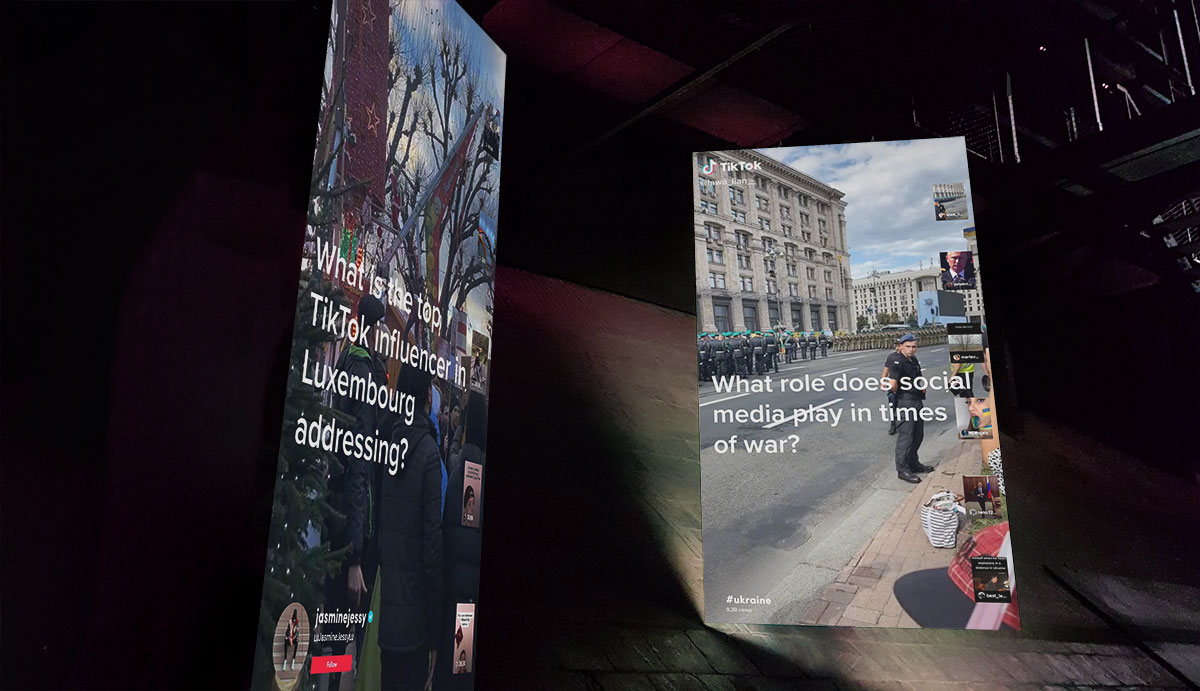
Lëtzebuerg Unfiltered – TikTok and the Emerging Face of Culture, Esch2022
»Lëtzebuerg Unfiltered – TikTok and the Emerging Face of Culture« is exhibited by ZKM - Center for Art and Media Karlsruhe show in Esch2022 (Luxemburg) - European Capital of Culture 2022.
For »Lëtzebuerg Unfiltered« we researched on TikTok, what Luxembourg really looks like and what it thinks. What are the people of Luxembourg really saying? What ideas are they projecting? What are the issues and concerns they are addressing? What were the missing voices in the mainstream narratives?
Thank you so much Anett Holzheid and Marie-Paule Greisch for your great research and the fruitful collaboration!
Hacking Identity – Dancing Diversity
Curated by Anett Holzheid & Peter Weibel
Where minette ore was once transported via conveyor belts and a gigantic ramp, digitally generated film images now unfold; where clouds of mineral dust once billowed up, sound waves of electronic music travel through the air. And instead of the mixture of metalliferous minerals (“Möller”) that used to be stored in cellar bins, an intriguing selection of artworks enters the newly refurbished Möllerei for the first time as Esch2022 – the year-long European Capital of Culture programme – gets underway.Under the heading Hacking Identity – Dancing Diversity, 28 contemporary artworks by internationally acclaimed media artists have been installed throughout the historic industrial building. Video installations, large-scale screen projections, participatory artworks and sculptural objects visualise phenomena related to the dissolution, transformation and duplication of identity. On three floors of the Möllerei, visitors can encounter doppelgängers, avatars, iconic figures from the world of gaming, bizarre sci-fi creatures and surprisingly ambiguous mirror images.
The invited artists employ strategies of commentary, quotation, recombination and defamiliarisation to challenge cultural norms of ethnic, social and gender identity; while the resulting works may be formally dissimilar, they all incorporate “hacking” as an artistic practice and active gesture. Originally derived from information technology, this term now has a positive connotation in popular digital culture and refers to creative methods of overcoming usage restrictions. Applied to the power of definition and to cultural norms, hacking also describes experimental forms of acting for change. As social realities and aspirational ideals in particular reflect messages encoded by media producers, the participating artists explore how media influence processes of identification – ranging from the cult of personality to emancipation, imitation and ironisation.
“Diversity” is a watchword in current social debates about representation, participation and the recognition of minorities. Differing interests and multiple voices can, however, narrow into inflexible lines of contemporary identity politics. Starting out from the humanitarian premise that diversity (from Latin diversitas ‘difference’, ‘contradiction’, ‘variety’) is the essential catalyst for active cultural development, Dancing Diversity opens up a space of poetic imagination. Dynamics of sovereignty emerge from processes of appropriating what is currently emerging and what has gone before; combining one’s own output with what others have produced. The metaphor of dance illustrates the interplay of individual and institutional forms of social cohesion.With this exhibition, in which a responsibility for democratic openness and a motivation to intervene for change are conveyed through media art, the Möllerei presents itself as a space for new ideas about European community and successful interculturalism.
Exhibited Artwork
Unfiltered – TikTok and the Emerging Face of Culture
Net-Based Multi Screen InstallationWith unprecedented and ever increasing access to mobile phones and the internet, digital hierarchies are being broken. Platforms like TikTok are the new town hall, with ‘influence’ no longer restricted to the urban elite. What have been the missing voices within mainstream narratives? Can their messages truly help shape an inclusive, socially conscious future? What impact does positive content more …
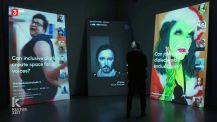
Kunstraum Walcheturm, Zurich
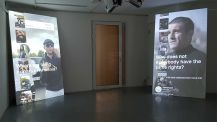
ICA, Yerevan
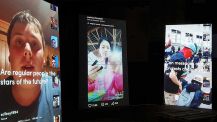
Reithalle, St. Moritz
Publication
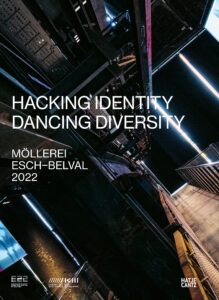
ESCH 2022, ZKM Karlsruhe, Hacking Identity - Dancing Diversity
Hatje CantzBook, color, 176 pages, 17 x 23.5 cm
2022
English, French
Ed. Anett Holzheid, Françoise Poos, text(s) by Anett Holzheid, Georges Mischo, Françoise Poos, Sam Tanson, Peter Weibel, graphic design by Rutger Fuchs
ISBN 978-3-7757-5239-8
hatjecantz.de
Exhibition Brochure DE, EN, FR
Remix Art: How Contemporary Media Art Forges New Narratives
Hacking Identity—Dancing Diversity opens a vivid kaleidoscope of artistic notions of identity that reflect upon the particular and the universal, the aesthetic and the intellectual, the historical and the futuristic, the human and the non-human. Organized in cooperation with the ZKM | Center for Art and Media Karlsruhe, a unique cultural institution in Europe, expanding the original tasks of a museum by combining research, exhibitions and performances, the exhibition is curated by Anett Holzheid, scientific consultant at ZKM, and Peter Weibel, its chairman and director.
more …